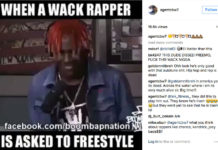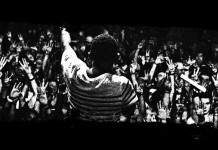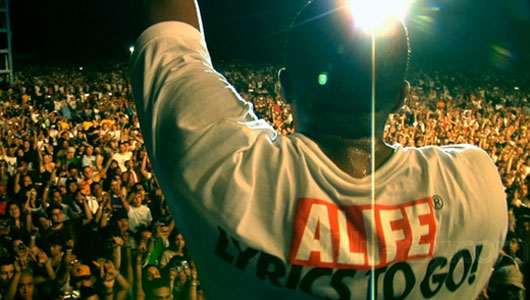Veteran actor and New York native Michael Rapaport seems at peace as he fields questions from Q&A moderator Wes Jackson (Brooklyn Bodega) and the CMJ Music Marathon & Film Festival faithful, after a special screening of Rapaport’s directorial ode to his favorite rap group, A Tribe Called Quest. The focused documentary, the first by Rapaport, Beats, Rhymes & Life: The Travels of A Tribe Called Quest, takes a peek into the lives of members Q-Tip, Phife, Ali Shaheed Muhammad, and Jarobi and tries to answer the question that Rapaport and every fan of this revolutionary ground breaking group from St. Albans, Queens wants to know: Will A Tribe Called Quest make more music?
The film, which is now available on DVD and BluRay, has garnered many positive reviews, was well received at the Sundance and Tribeca Film Festivals and took home the audience award for Best Documentary at the Los Angeles Film Festival, however the months leading up to and including the release was fraught with drama.
When a leaked, unfinished trailer premiered online in early 2011 painting the group’s relationship as being seriously flawed, it ignited a war of tweets among Rapaport and the group. This led to the group nearly revoking support for the project, crushing Rapaport and threatening to derail the positive vibe that fans were feeling, eagerly awaiting the release. The documentary eventually did find its way into theaters in the summer of 2011, and in general, moviegoers reported that the film was worth the wait.
SAVE THE DRAMA
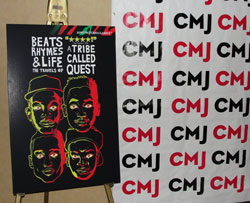 Rapaport admits that 2011 was some of the most tumultuous and trying times of his career. A lifelong fan of ATCQ, Rapaport was honest, revealing and held nothing back as he answered questions and spoke at length about the creative process behind the movie to the audience gathered at Chelsea Cinema in New York City.
Rapaport admits that 2011 was some of the most tumultuous and trying times of his career. A lifelong fan of ATCQ, Rapaport was honest, revealing and held nothing back as he answered questions and spoke at length about the creative process behind the movie to the audience gathered at Chelsea Cinema in New York City.
The spark for the documentary was lit when Rapaport attended ATCQ’s final live performance in 1998. He remembers having a conversation remarking how great it would be for someone to do a documentary on a ATCQ, an idea of his that simply manifested itself and got bigger and bigger. “Making a documentary is challenging,” Rapaport told the audience, “It’s not an easy thing. Nothing is handed to you. The technical and financial aspects of it are a grind. It is a grind from beginning to end.”
When asked by Jackson why the movie starts so dramatically, Rapaport explained that this was the atmosphere he was exposed to when he started filming the group back in 2008. “The dysfunction that I saw was very apparent from the first day of filming. I wanted to start the film by showing what my reality was.”
To see that they were human and had flaws like most relationships do was an eye opener for Rapaport. To him, ATCQ always had this “intangible quality of positivity, and their music was uplifting.” It became a movie about relationships, because the relationships within ATCQ were similar to countless other dysfunctional relationships. There are not always going to be fun times. There will be discord and hostility. Rapaport believed that seeing ATCQ behave as normal people, showed that despite their seemingly superhero music star status, there was genuine humanity at work.
By immediately segueing into the colorful and captivating animation by James Blagden (who was in attendance and received a nice round of applause), Rapaport wanted to keep the audience off balance, thinking it would have been too predictable to start the film the way people thought he might. Ultimately, one of Rapaport’s main reasons for making the film was to find out if ATCQ would be making more music, without trying to explain whether they should or why they shouldn’t record new music. The question was: When would they?
GET THAT OLD FEELING BACK?
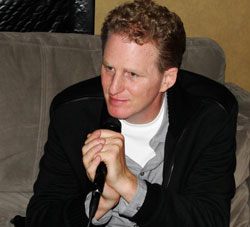 “You never want to let go. You want to go back and relive that, but you can’t. Things move forward and you can’t,” lamented Rapaport. “You are never going to hear ‘Bonita Applebum’ on the radio for the first time. It’s changed. I think [the group members] understand the legacy and what it means to fans and as artists. I think they are smart enough to understand if they are going to do it, it’s going to be different. I think A Tribe Called Quest has run its course. Beatles ran its course. The Supremes, Destiny’s Child. There are so few groups in any genre of music that have ever stayed together for the long haul. The Rolling Stones did it and you listen to them talk. ‘I wanted to fucking kill Mick Jagger.’ Keith Richards said that. They get together a lot of times, just to perform. It’s not what you think as fans, that Mick and Keith are always hanging out. They’re not. Q-Tip and Phife are not always hanging out.”
“You never want to let go. You want to go back and relive that, but you can’t. Things move forward and you can’t,” lamented Rapaport. “You are never going to hear ‘Bonita Applebum’ on the radio for the first time. It’s changed. I think [the group members] understand the legacy and what it means to fans and as artists. I think they are smart enough to understand if they are going to do it, it’s going to be different. I think A Tribe Called Quest has run its course. Beatles ran its course. The Supremes, Destiny’s Child. There are so few groups in any genre of music that have ever stayed together for the long haul. The Rolling Stones did it and you listen to them talk. ‘I wanted to fucking kill Mick Jagger.’ Keith Richards said that. They get together a lot of times, just to perform. It’s not what you think as fans, that Mick and Keith are always hanging out. They’re not. Q-Tip and Phife are not always hanging out.”
Reflecting over the controversy over what the movie would show onscreen, Rapaport stated that he believed he made a movie that was far more honest and revealing than anyone expected. He explained that to this day he has not been in the same room with all four ATCQ members. Rapaport screened the movie for them separately and they all seemed fine with it, but the leak and subsequent war of tweets suggested that ATCQ was not in full support of their own documentary.
“I can’t speak on the group’s behalf,” said Rapaport. “When I first screened the movie for the guys, I was the hero… The bottom line is that things happened. I wish the guys were here now. Pearl Jam just released their documentary, and they were all standing there taking pictures. The fact that the guys haven’t supported the movie as a group has more to do with the dysfunction of ATCQ than Michael Rapaport. They haven’t recorded an album since 1998. I wasn’t a part of that. ATCQ is done as far as now and that happened long before I even stepped to them about making the movie. All that missed communication and confusing information has nothing to do with me. I know my part and I know my intentions and I know why I made the movie. I know I went out of my way to protect and respect the legacy of ATCQ as gentlemen, as people and as a group. If the material I shot was in the hands of 99.9% of other directors hands, it comes out a different movie. It wouldn’t be as good. It would be more ‘reality show’.”
One of the most surprising things Rapaport encountered was Phife’s health condition. While he had some sort of idea that Phife was a diabetic, he had no idea how serious his condition was. Rapaport didn’t even think there was a chance he would discuss it, but Phife ended up being so open and candid about his health that Rapaport knew this would be a big part of the film. Not only was it a serious issue that was going on during filming, but Phife had been dealing with diabetes for the last 16 years, which affected and fractured the group dynamic. Phife missed shows when he was sick, a point highlighted in the film when an early 1990s Dennis Miller TV appearance shows only Q-Tip and Ali on stage, Phife having pulled out at the last minute due to his illness.
Jackson, himself an ATCQ fan, asked Rapaport about keeping the camera on in moments of conflict. Rapaport explained, “When it was the most uncomfortable, I knew that it was time to step up and be the documentary film maker. I was very aware of that. The stuff with Tip, Ali and Maseo ranting in the dressing room in Seattle. They were in one dressing room and Phife was in another dressing room. They were about to do a show. I was shooting it by default, because I was the only one they let in there. It was very uncomfortable. I’ve been in relationships that have been flawed and fractured my whole life, but to see others do it… My place wasn’t to judge them or fix it, but just to document. I knew the most uncomfortable, vulnerable time was the time to keep the camera on. I would never intentionally let things get out of hand or disrespect the legacy of ATCQ or disrespect them as individuals. Too much information sometimes is not necessary in the film. You don’t need every single detail of this argument or this beef.”
“I’m not going to figure it out,” he continued. “There is no answer.”
BRINGING IT ALL TOGETHER
The immense editing process that Rapaport went through to get this film released in a relatively concise, 97-minute long package, was daunting, but once he decided that this movie was just going to be about these four individuals, the editing process became easier. “You shoot, you shoot and shoot and you realize that you got some stuff you didn’t plan on, you didn’t get some stuff that you planned. You get these moments of gratification and these other movements of utter horror and fear when you’re saying, ‘How am I going to do this?’ I knew in the editing room that there were certain things I had to cut, because I only had 97 minutes to tell the story. Some things had to go. Consequence’s involvement in the group had to go. J Dilla’s involvement had to go. Busta Rhymes was a blink in the movie. I was aware of that.”
There were many interesting stories to be told, but Rapaport had to make choices.
“Just from four people it becomes enough, without everyone else. The film had to be about the four guys and A Tribe Called Quest. I couldn’t put in anything else. Once I had the framework, it had to be about the guys. We shot 100 hours of footage. We can’t touch on Zulu Nation for just three minutes. We need to do a whole film about that. It was too much to process. It had to be story driven. You want to go forward you want to go deeper. It’s all about pushing the story forward. I’m not doing a whole thing on everyone. You have to make choices. You have to what’s best for the film. If its not story driven, it has to go.”
An audience member posed this question: “What do you want people that are not familiar with A Tribe Called Quest to take away?”
Rapaport answered, “I hope that people who aren’t familiar with ATCQ walk away learning about one of the most important groups to make music in the last 30 years of any genre. One of things that I’m most proud about is that in my opinion, it breaks down the stereotype of what a hip hop artist is. These guys didn’t make music because they were selling drugs and wanted to get out of it. They never got shot. They’re good guys from good families. They’re musicians and you see them as very human vulnerable guys, and if you know nothing about hip hop except for the stereotypes, this will definitely change that. For me personally, I’m enormously proud to be a part of broadening and showing what hip hop is about and who hip hop artists are.”
Rapaport continued, “I’m lucky to be doing what I’m doing. I’ve been doing it for 20 years now as an actor. I’m fortunate especially this day and age. Documentary filmmaking is not something you do for money. There is no big pile of money, no pile of gold at the end of the rainbow. Michael Moore, Inconvenient Truth… That’s lightning striking. I made this movie for love, my love of music, of hip hop and A Tribe Called Quest. We’ll be lucky and happy if we make a few bucks, but nobody is getting rich off this and we all knew that from the beginning. I didn’t make this film alone. I had a great team around me. It was a passion project. I’m fortunate to be in a place where I had the time and the money to do a passion project in this day and age. I’m humble about that. I’m humble that I was able to have the means to make the film and finance it myself in the beginning and have other people get involved”
EPILOGUE
Personally, I enjoyed the documentary, but then again I’m a huge Tribe fan. While I feel many questions were left unanswered, Michael Rapaport did a commendable job with what he had access to. A Tribe Called Quest is certainly worthy of a Ken Burns-esque treatment, but Rapaport was nevertheless able to present a piece of cohesive filmmaking that delivers ATCQ like we have never seen before. Could it have gone a little deeper? Sure, but Michael Rapaport’s honest and open insight into working with one of the most entertaining rap groups to ever touch the stage was refreshing. Be sure to cop the DVD. The deleted scenes and extras, as well as the Director’s commentary, also provide a lot more answers.
Birthplace Magazine got a chance to ask the last two questions of the night, and Rapaport was kind enough to compliment my sneakers.
What is your favorite Tribe album and why?
My favorite, it’s hard to pick one, but I think Midnight Marauders encompasses everything that the first two classic albums (People’s Instinctive Travels, The Low End Theory) did and takes it to the next level. Midnight Marauders is special.
What about Madlib’s involvement in the movie?
Madlib was a no brainer. I wanted to have somebody do the music that was inspired by ATCQ and Madlib, I knew that before I ever met him, that he was inspired. You could hear it in his music. I used the first person I wanted to have do the music and he said yes.
I see your kicks there… You got the green, black and red Tribe joints. That’s beautiful.
Thank you. Appreciate it!
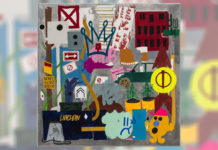
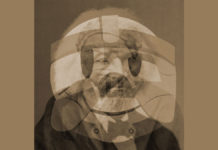
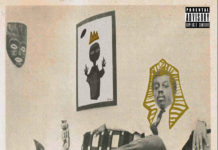
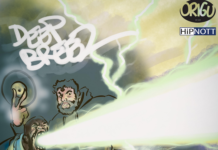

![The Underachievers – Crescendo [VIDEO]](https://www.birthplacemag.com/wp-content/uploads/2017/08/hqdefault-2-218x150.jpg)


![Fat Joe & Remy Ma ft. The-Dream – Heartbreak [VIDEO] Fat Joe Remy Ma The Dream - Heartbreak Video](https://www.birthplacemag.com/wp-content/uploads/2017/05/fat-joe-remy-ma-218x150.jpg)
![JSWISS featuring Chandanie – LML [VIDEO] JSWISS featuring Chandanie - LML [VIDEO]](https://www.birthplacemag.com/wp-content/uploads/2017/05/JSWISS-218x150.jpg)

![Akinyemi Ends Summer With “Summers” EP Release Show [9-17-17] Akinyemi 'Summers' EP release show at Brooklyn Bazaar](https://www.birthplacemag.com/wp-content/uploads/2017/09/summers-featured-218x150.jpg)
![4th Annual NYC VS EVERYBODY Yacht Party [9/16/17] #VSYacht 4th annual NYC VS Everybody Yacht Party#VSYacht](https://www.birthplacemag.com/wp-content/uploads/2017/09/vsyacht-218x150.jpg)




